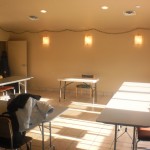A couple days ago I had the opportunity to be a part of legal and social media history. It was the first time that a legal appeal has been argued over twitter. The Vancouver Sun article on it can be seen here. The moot competition brought together teams from several of the top Canadian law schools and judges from across the country. The case at hand was an appeal of the West Moberly decision.
“The West Moberly First Nations’ court case focused on mining exploration being carried out by First Coal Corporation in the habitat of the Burnt Pine Caribou Herd. … The government’s own experts cautioned against the impact on the Burnt Pine herd, which previous development has reduced to 11 members.”
Within the case we were set to focus on two key issues: the extent to which a right to hunt could be limited to a specific herd of caribou, and the extent to which previous development should be factored into the decision making process. Through a lottery, Team UBC was set to represent the Province of Alberta. This meant that we had to support the views of the provincial government without reflecting our own personal beliefs. On the first issue, Team UBC was focused on showing that the right to hunt should not be narrowed to a single herd of a single species, but should be a broad right to hunt within a general geographic area. Team UBC also supported the view that past actions should not be included in the decision making, and should only relate to the development at hand.
I first became involved with this project because of my familiarity with the great work of West Coast Environmental Law. I have been undertaking an internship at this organization since September and have gotten to see the impact the people here have on protecting the environment every day. I decided to undertake this level of work at West Coast because of my belief that our politics has become too focused on the short-term, ignoring those long term challenges that include climate change, the growing debt and deficits, and the growing inequalities in society. This is what I have written about in my book New Liberalism, which you can find out more about here: www.new-liberalism.com
The purpose for writing this article is that I have been asked to discuss the experience of taking part in the world’s first Twitter Moot. It is only natural to begin with the preparation that went into it. We were given our team positions, and were set off to research the case. We then had to put together a two page factum setting out our points. This factum needed to explore our position on the two issues described previously. The next big step was to go through a practice run with WCEL. The organization sent out the rules and a memo discussing what should take place, followed by a Webinar that allowed more interaction – including some test tweets. This was an online training course that allowed teams from across the country to take part. I then met with my teammate to discuss our strategy. Since we were pretty much meant to support the views of the two teams that would go before us, we decided that we would put forward a ‘hail mary’. We thought it would be best to focus on the ‘twitter’ end of the twitter moot. While we still made sure to present solid arguments, we also thought a debate over this medium needed to include references to @vikileaks30, and the likely retweeting of our arguments by @AshtonKutcher because of their popularity. This helped get #twtmoot trending in Canada. This approach led to the comments that can be found here: http://blog.skunkworks.ca/tag/history-made-in-twitter-moot/
On the day of the event itself I woke up early to discuss this turning point in the legal profession on CBC Early Edition. I then went to the office, where I got my computer set up to show four things: the twitter feed on the WCEL website, the twtmoot list on Twitter, a page with notes, and my personal twitter page so I could compose messages. Needless to say it was a little crammed. I got the chance to watch two teams present before Team UBC, but that still could not prepare me for the fast paced event that was yet to come. It did not feel like a traditional moot that rewards speaking at length. Instead, it was furious typing and refreshing, trying to continue submissions while being blasted with questions from three prepared judges. It was definitely a new experience! I never thought that I would ever be measuring how long it takes to write out a single tweet, but such is the journey of life.
The big question that comes out of this is the future of social media and the law. As we have seen in most other areas of our life, modern technology continually changes the culture that has come before. I don’t believe that this medium could ever replace the traditional courtroom, but social media certainly will change the way the law is communicated, just as it has changed politics, the news and life in general. Law at its core is a communication and organization tool in society, and so it seems highly unlikely that our actions in making history will not lead to more interaction between these two worlds. It is exciting to be at the turning point of a new legal profession, and I am energized to see its shape and contour in the coming years.



